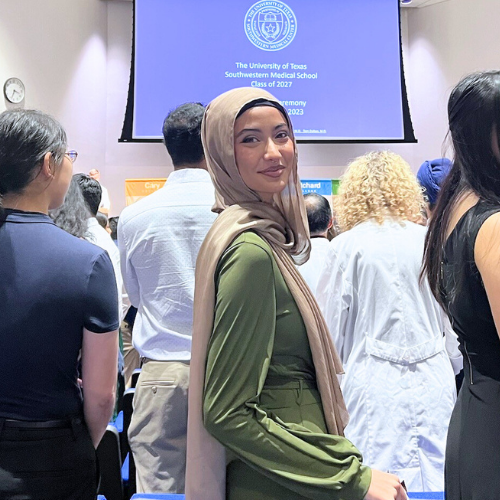For 24-year-old Hafsa Khalil, a UHD graduate and third-year medical student at UT-Southwestern Medical School, her journey in medicine began in middle school.
Originally from Houston, she lived in India with her family for most of her high school years, where her father, who worked in healthcare administration, held free healthcare camps for local residents.
Khalil and her siblings attended these healthcare camps with their father, helping to take care of patients. This was her first exposure to medicine, and opened the pathway for her interest in how doctors do their jobs.
When she returned to the US at the end of 11th grade, Khalil took her exit exam to skip 12th grade and graduate high school. She then stepped into the college world at UHD upon recommendation from her older sister, a UHD graduate.
Khalil was also a member of Scholars Academy, where she gained mentorship and made some of her closest friends. She graduated in 2023 with a bachelor’s degree in biological and physical sciences. The connections with fellow students, mentors, and professors she developed at UHD have continued to positively shape her life today as a medical student.
During her first year of college, Khalil worked as a medical scribe in an ER before and during the COVID-19 pandemic. Despite the pressures of working in the ER during the pandemic, Khalil was helping others, and she was fascinated by watching how the doctors worked.
“As soon as the patient would roll in, they'd know exactly what to do,” she explained. “And they would do their best, and sometimes the outcomes weren't as great, but a lot of the times they really, really did make a huge impact on those patients' lives.”
This experience inspired Khalil to fully pursue medicine, as she too wanted to be capable of making a difference in patients’ lives.
Currently, Khalil is in her clerkship phase of medical school, where she gets to apply her prior two years of studying in a hospital setting under the supervision of experienced physicians.
Because of her initial exposure to medicine in India, she has chosen her distinction in global health, which involves traveling abroad and working with researchers, doctors, and patient populations in other countries.
Last summer, she traveled to Botswana, where she worked with a doctor from the University of Pennsylvania in radiation oncology and women’s health. She also contributed her knowledge in South Africa, Zambia, and Zimbabwe, and most recently finished neurology and epilepsy research in Turkey only a month ago.
“That is definitely going to remain one of my passions throughout this entire journey,” Khalil said. “I would love to always be able to contribute to global health.”

